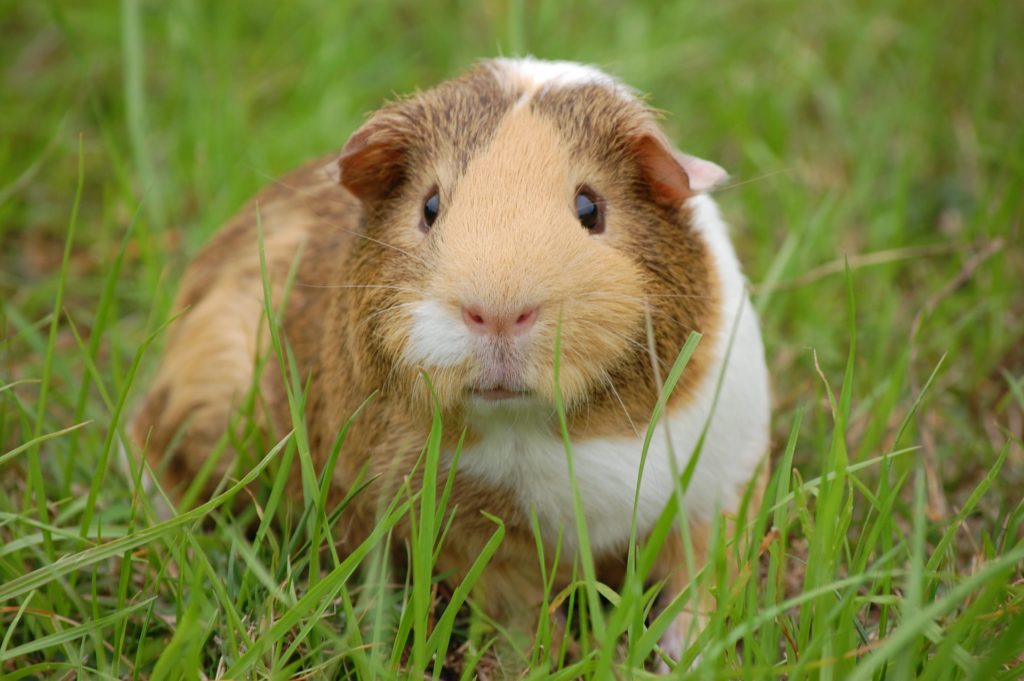Guinea Pigs

Guinea Pigs are friendly and playful animals, and they can make for a wonderful addition to your family. However, there are always things to consider before welcoming any new pet into your home, and guinea pigs are no different. In honor of March being Adopt-a-Rescued-Guinea Pig- Month, here is some information on these fluffy friends to help you decide if they are the right pet for you.
As with any pet, it is important that you have enough time to incorporate pet ownership into your everyday schedule. The responsibility of caring for a guinea pig should not be taken any less seriously than that of a dog, cat, or any other pet. Guinea pigs need to be properly groomed and have their cages thoroughly cleaned on a regular basis, and they require daily interaction outside of their cage. All of these responsibilities are necessities and essential for a guinea pig’s well-being.
“Guinea pigs are generally friendly and curious animals and can make great pets,” said Dr. Caitlin Burrell, a zoological medicine intern at the Texas A&M College of Veterinary Medicine & Biomedical Sciences. “It is important, however, that parents teach their children how to handle guinea pigs correctly, how to clean their cage and change their food, and how to tell if they are feeling ill.” If you are bringing a guinea pig into your home as a family pet, make sure that your children are ready to take on the responsibility. Figuring pet ownership into a busy after school and weekend schedule can often be difficult for children to juggle. Adult supervision may also be required for younger children.
Once you have decided you are ready to become a guinea pig parent, your next task will be choosing a breed that best suits your family. “There are four types of guinea pigs commonly seen as pets: the Shorthair or English, the Abyssinian, the Silky, and the Peruvian,” said Burrell. “They can be found at pet stores but many shelters have small mammals, such as guinea pigs, that would love to be adopted!” Most animal shelters now accept small animals that are in need of loving homes, and you could save a well deserving guinea pig’s life while finding the perfect addition to your family.
Guinea pigs can be housed in a variety of cages. “Wire cages can be used but it is important to provide an area of solid flooring to prevent foot lesions,” said Burrell. “Cages can be filled with bedding materials like shredded paper or aspen shavings, but cedar and pine shavings should be avoided. Bedding material also needs to be changed regularly so that toxic substances don’t accumulate.”
Another factor to consider when creating housing for your new pet is the location of the cage. Make sure it is safe from any other pets in your home that may view them as prey, and put somewhere that social interaction and out-of-cage play time may be supervised if you have small children. “They should also be kept in a temperature and humidity controlled area and should have places within the cage that they can hide,” said Burrell.
As for food and diet, guinea pigs are herbivores that require a proper balance of fresh pellets, hay and fresh vegetables on a daily basis. “They need lots of high quality hay to promote dental health, keep their gastrointestinal tract functioning normally, and to maintain a healthy weight. They can also be offered small amounts of guinea pig pellets and fresh veggies, but the main part of their diet should be hay,” said Burrell. “Additionally, guinea pigs need Vitamin C in their diet because they cannot synthesize it themselves. There are diets that have been supplemented with Vitamin C, but this can degrade rapidly as the food sits on the shelf.” Burrell suggests that certain vegetables, such as dark leafy greens, peppers, or parsley can be a good source of Vitamin C as well.
Rescuing a pet guinea pig from your local animal shelter could bring tremendous amounts of joy and life into your home. With the proper care and adequate attention, these small pets can earn a large spot in your heart.
Pet Talk is a service of the College of Veterinary Medicine & Biomedical Sciences, Texas A&M University. Stories can be viewed on the Web at vetmed.tamu.edu/news/pet-talk. Suggestions for future topics may be directed to editor@cvm.tamu.edu.


